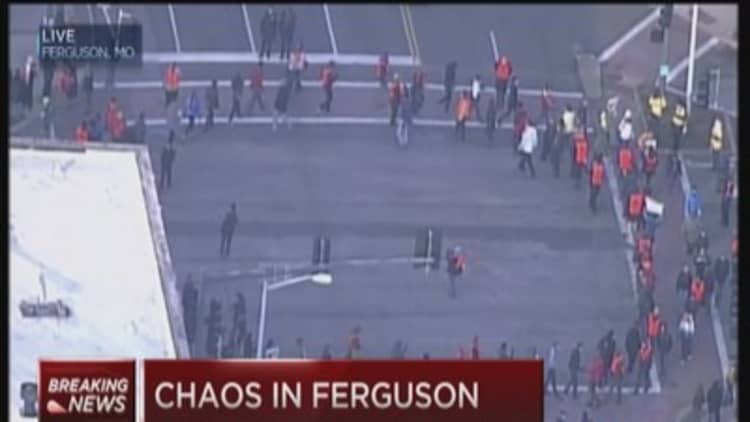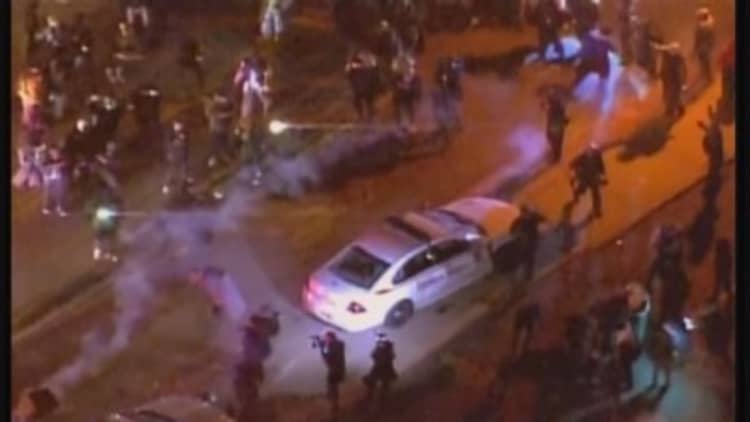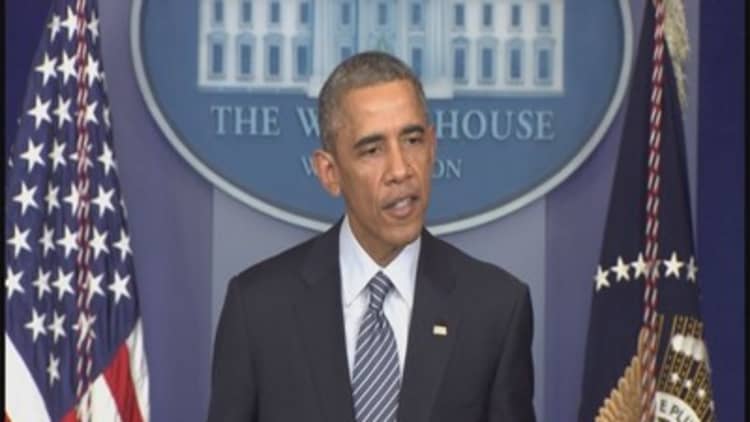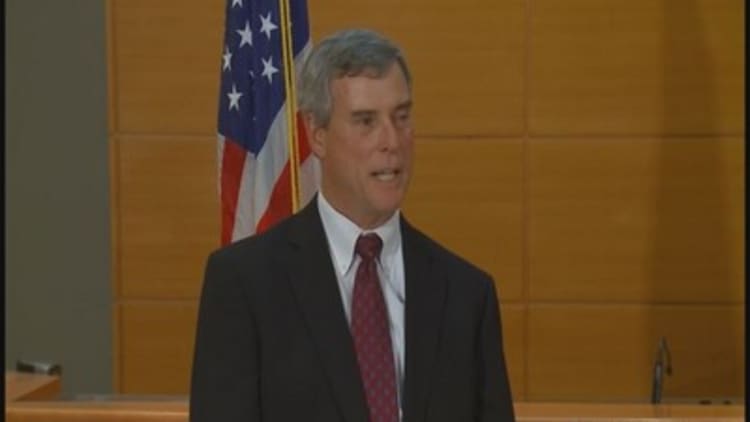



A grand jury chose Monday not to indict Darren Wilson, the white police officer who shot and killed unarmed black teen Michael Brown on a street in Ferguson, Missouri, in August. Violence, looting, fires and gunshots erupted as anger broke out immediately.
At Ferguson police headquarters, protesters pelted officers with bottles, officers reported shots fired, and a team in riot gear ordered a crowd of several hundred people to disperse. Nearby, St. Louis County police deployed tactical units and fired tear gas to break up unruly crowds as helicopters circled the area.
A police car was one of the first objects to be set alight. An MSNBC reporter saw fire and looting in a cellphone store and a window that had been smashed at a McDonald's. Police and protesters stared each other down on an interstate, and a gas station, pizzeria, several more cars and a storage facility were among other buildings engulfed by flames.
Scattered volleys of what reporters described as gunfire could be heard more than two hours after the announcement of the grand jury's decision. St. Louis police reported "heavy automatic gunfire" late into the night.
Just after 1 a.m. ET, police said that an officer in Universal City, a suburb north of St. Louis, had been shot in the arm. Authorities later said the shooting was unrelated to the protests in Ferguson.
The protests were so volatile that arriving airplanes were diverted from the airport in St. Louis, and the Federal Aviation Administration ordered planes out of the airspace over Ferguson.
President Barack Obama, speaking late at night from the White House even as clashes were erupting in Ferguson, called on both sides to exercise restraint.
"We are a nation built on the rule of law, so we have to accept this decision was the grand jury's to make," Obama said.
Read MoreWhere Ferguson's 'military' police get their gear
Referencing the racial strains exposed by the turmoil in Ferguson, the president said: "In too many parts of this country, a deep distrust exists between law enforcement and communities of color." But he added: "There's never an excuse for violence."
People took to the streets across the country. More than 1,000 marched in Manhattan, and in Oakland, California, hundreds chanted, "No justice! No peace!" A crowd of about 300 gathered at the White House. Protests also sprang up in Philadelphia and Chicago.
Bob McCulloch, the St. Louis County prosecutor, described Brown's death as a tragedy but said that the grand jury had found no probable cause for any of the charges it considered against Wilson, which included first-degree murder and the lesser charge of manslaughter.
The officer, 28, testified to the grand jury that he was sitting in his patrol car on Aug. 9 when Brown approached and punched him, McCulloch said. In the encounter that followed, Wilson fired 12 shots — two inside the car and 10 on the street, the prosecutor said.
Some witnesses had said publicly that Brown, 18, was shot and killed with his hands up. But the prosecutor said that some witnesses had changed their statements, or later admitted that they had not seen anything directly.
McCulloch said that the grand jury investigation found that some witness statements were "completely refuted by the physical evidence." He said that the biggest challenge to the investigation was rumors on social media and "the 24-hour news cycle and its appetite for something, anything, to talk about."
Speaking for almost an hour, the prosecutor said that he knew some people would be disappointed, but he said decisions in the justice system could not be based on "public outcry or for political expediency."
The Brown family said in a statement: "We are profoundly disappointed that the killer of our child will not face the consequence of his actions." The family repeated its calls that protesters remain peaceful.
The NAACP expressed outrage and said on Twitter that "police brutality and militarization" must end.
Wilson's lawyers said in a statement that he had followed his training and the law.
"Law enforcement personnel must frequently make split-second and difficult decisions," the statement said. It added: "Officer Wilson would like to thank those who have stood by his side throughout this process."
In a 31-minute police interview, taken soon after the shooting and released Monday after the grand jury decision, Wilson described encountering Brown and a friend on the afternoon of Aug. 9 and suggesting that they move from the street to the sidewalk.
More from NBC News:
'Profoundly Disappointed': Michael Brown Family Reacts to Lack of Indictment
Woman Who Got Cosby Money Orders Says They Were Just 'Generosity'
Thanksgiving Travel: Snow, Ice, Wind Could Cause Trouble FromNortheast to Georgia
He said that one of the young men hurled an expletive at him, and that Brown then approached his police SUV and "started swinging and punching at me from outside the vehicle." He said that they wrestled for the officer's gun, with Brown grabbing around Wilson's hand and pointing the gun into the officer's hip.
"At that point, I was guaranteed he was going to shoot me," Wilson told a detective. The officer said he angled himself into a different position, then pulled the trigger and fired at Brown.
Wilson said that Brown ran away and he chased. He said Brown turned, "had the most intense aggressive face I've ever seen on a person," and charged, with his hand under his shirt and inside his waistband. He said that he ordered Brown to get on the ground, and when he did not, he fired at Brown.
He said that Brown charged at him, "still running at me, hadn't slowed down, hands still in his waistband." Wilson said that Brown was 8 to 10 feet away when the officer fired more shots and Brown fell.
"His right hand was still under his body, looked like it was still in his waistband," Wilson told the detective. "I never touched him."
Ferguson, a previously little-known suburb of St. Louis, was rocked by clashes night after night this summer between demonstrators and police with military-style equipment. And in the days before the grand jury returned its decision, the city prepared for another round of violence.
Before the announcement on Monday, businesses boarded up windows, and schools closed early for the following day. Police beefed up patrols. Gov. Jay Nixon, who had readied the National Guard days in advance, pledged that law enforcement would focus on protecting lives, property and free speech.
"Our shared hope and expectation is that, regardless of the decision, people on all sides show tolerance, mutual respect and restraint," he said.
Early Tuesday, Nixon ordered additional Missouri National Guardsmen to Ferguson.
The grand jury was composed of six white men, three white women, two black women and one black man, selected at random from St. Louis County, which is about 70 percent white. Ferguson, a city of 21,000 people, is about two-thirds black. It takes nine of 12 votes to indict.
- Tracy Connor, Richard Esposito, Tracy Jarrett, Trymaine Lee, Craig Melvin and Mary Murray contributed to this report.

